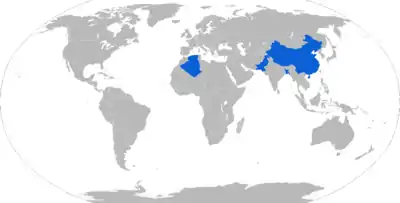HQ-7
The HQ-7 (simplified Chinese: 红旗-7; traditional Chinese: 紅旗-7; pinyin: Hóng Qí-7; lit. 'Red Banner-7'; NATO reporting name: CH-SA-4)[3] is a short-range surface-to-air missile (SAM) from the People's Republic of China. It was developed by the Changfeng Electromechanical Technology Design Institute from the French R-440 Crotale SAM.[2] It entered service in the early 1980s.[1]
| HQ-7 | |
|---|---|
.jpg.webp) FM-90 of Bangladesh Air Force | |
| Type | Surface-to-air missile |
| Place of origin | People's Republic of China |
| Specifications | |
| Mass | 84.5 kg (186 lb) |
| Length | 3 m (9.8 ft) |
| Diameter | 0.156 m (6.1 in) |
| Engine | solid fuel rocket |
Operational range | |
Guidance system |
|
Launch platform | |
A ground battery consists of a short-range radar and three launchers. Each launcher has four or eight missiles.[1]
Variants

Eight-missile HHQ-7 launcher on Shenzhen.
- HQ-7A
Original command-guided version.[2]
- HHQ-7
- HQ-7B
Improved version.[6]
- FM-80
Export version of the HQ-7A.[2]
- FM-90
Export version of the HQ-7B.[6]
- FM-90N
Operators

Map with HQ-7 operators in blue
FM-90.[9]
HQ-7A, HQ-7B[10] and HHQ-7.[5]
FM-80.[11]
FM-90 and FM-90N.[8]
FM-90.[12]
See also
References
- United States Department of the Army 2021, p. 87.
- Medeiros et al. 2005, p. 87.
- "6 Asia". The Military Balance 2023. 15 February 2023.
{{cite book}}:|work=ignored (help) - The International Institute for Strategic Studies 2022, p. 251.
- The International Institute for Strategic Studies 2022, p. 258.
- Einhorn & Sidhu 2017, p. 54.
- The International Institute for Strategic Studies 2022, p. 250.
- The International Institute for Strategic Studies 2022, p. 298.
- The International Institute for Strategic Studies 2022, p. 333.
- The International Institute for Strategic Studies 2022, p. 257.
- The International Institute for Strategic Studies 2022, p. 341.
- The International Institute for Strategic Studies 2022, p. 210.
Sources
- Einhorn, Robert; Sidhu, W.P.S. (March 2017). The Strategic Chain: Linking Pakistan, India, China, and the United States (PDF) (Report). Arms Control and Non-Proliferation Series. Brookings Institution.
- Medeiros, Evan S.; Cliff, Roger; Crane, Keith; Mulvenon, James C. (2005). A New Direction for China's Defense Industry (PDF). RAND Corporation. ISBN 0-8330-3794-3.
- The International Institute for Strategic Studies (2022). The Military Balance 2022. Routledge. ISBN 978-1-032-27900-8.
- United States Department of the Army (9 August 2021). Chinese Tactics (PDF). Army Techniques Publication. Washington, D.C. 7-100.3.
{{cite book}}: CS1 maint: location missing publisher (link)
This article is issued from Wikipedia. The text is licensed under Creative Commons - Attribution - Sharealike. Additional terms may apply for the media files.